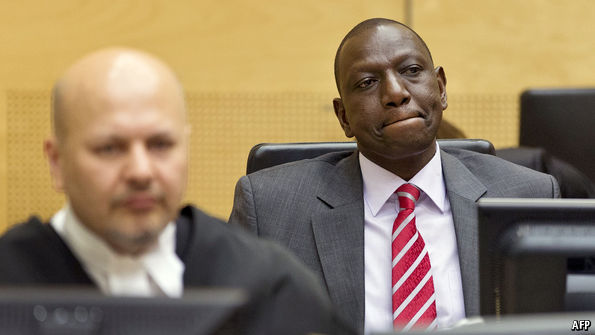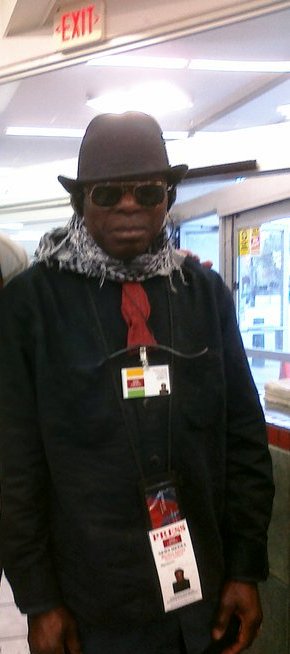Kenya’s deputy president gets off scot-free
The collapse of the case against William Ruto will hurt the International Criminal Court

STREET parties are only rarely inspired by international legal judgements. However, Eldoret, the hometown of William Ruto, Kenya’s deputy president, bopped after charges against him and against a local radio journalist were dropped by the International Criminal Court (ICC) on April 5th. Drunken revellers crowded the cameras as TV anchors tried to explain the news. The party was led by the local MP and the county governor, who apparently asked the police to tolerate the raucousness. But while the decision is a boon to Mr Ruto and his constituents, it is a serious blow to the ICC.
The case against Mr Ruto began in 2010, when allegations against him and Uhuru Kenyatta, now Kenya’s president, were referred to the ICC by Kofi Annan, the UN’s former secretary-general. The two were accused of orchestrating violence which killed at least 1,300 people after disputed elections in 2007. The charges against Mr Kenyatta were dropped in December 2014 but those against Mr Ruto continued, threatening the coalition that brought the pair to power in 2013. Now that the charges have been dropped, it will be much easier to reconstitute that alliance for the presidential elections due in August 2017.
In a statement, Mr Kenyatta said the decision “brings to a close what has been a nightmare for my nation”. After a “painful journey”, the court “reaffirms my strong conviction from the beginning about the innocence of my deputy president”, he said. That sentiment was firm across the Kenyan establishment. Even Raila Odinga, the opposition leader, congratulated Mr Ruto on the decision, before calling for the government to pay compensation to the victims of violence.
The case had certainly poisoned relations with the West. Mr Kenyatta accused the court of being a tool of neocolonial persecution. But his claims that his government had co-operated and that the decision proved Mr Ruto’s innocence were disingenuous. Mr Ruto was not acquitted. Rather, the case was dropped for lack of evidence. The presiding judge, Chile Eboe-Osuji, said that he had wanted to declare a mistrial “due to the troubling incidence of witness interference and intolerable political meddling”. Several witnesses had recanted their testimony; others simply went missing. The prosecution’s case was torpedoed when the court decided in February that recorded interviews of witnesses who subsequently recanted could not be used as evidence. In theory, prosecutors could try again in the future.
With elections coming next year, many Kenyans are worried that violence will flare up again. Mr Ruto’s and Mr Kenyatta’s alliance works well because they bring two of Kenya’s largest ethnic groups together: the Kikuyu, Mr Kenyatta’s tribe, which has dominated Kenyan politics most of the time since independence, and the Kalenjin, Mr Ruto’s group, who are populous in the Rift Valley. But other tribes, in particular the Luo, Mr Odinga’s lot, feel left out of government.
For the ICC, the decision is a blow, though not unexpected. The court has long annoyed African politicians, some of whom accuse it of disproportionately targeting their continent. Nine out of ten sets of cases where there are indictees are African, though most of them were referred to the court by African governments themselves. In January Kenya put forward a proposal to other African Union states to pull out of the court entirely. The failure to convict Mr Ruto suggests that the court can easily be frustrated when governments do not want to co-operate. In June, South Africa failed to arrest Omar al-Bashir, Sudan’s president, who was on South African soil and is wanted on charges of war crimes and genocide.
For the moment, several trials continue, but most of them involve former politicians, not current ones. One example is the trial of Laurent Gbagbo, the ex-president of Ivory Coast, who started—and lost—a short war to stay in power when he lost an election in 2010. African despots who have lost power may still have reason to fear it. But for those who stay in, the court is beginning to look much less threatening.

No comments:
Post a Comment